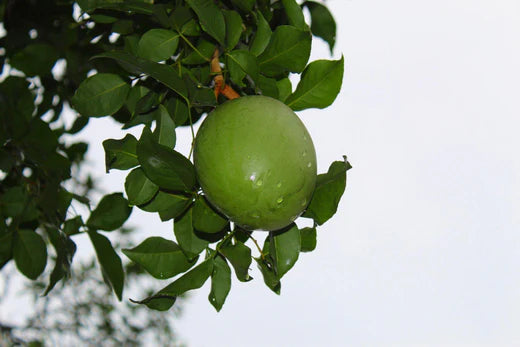The Bael tree is a spiny, scented, deciduous tree with long, powerful, and axillary spines. The Bael tree can reach heights of up to 18 m, and it can be 3–4 ft thick. Bael leaves have three to five foliations, oval leaflets, and a distinctive scent. Bael Flowers have a lovely aroma and are greenish-white in hue. Large, woody, greyish yellow, 8–15 celled bael fruits feature a luscious, gooey orange pulp. Bael seeds are located in an aromatic pulp and are compressed, oblong, and abundant.
General Information
In Sanskrit, Bael is also known as Bilva. It is more frequently referred to by the same name in Ayurveda. This herb has significant medical, mystical, and religious value. Bilva leaves and fruits are used as offerings to Hindu deities like Lord Shiva and are regarded as sacred. Because of this, it is often referred to in ancient texts as "Shiva druma" or the Shiva tree.
In addition, Bilva is well-known for having excellent blood sugar-controlling properties, which are the subject of extensive research. Additionally, it promotes healthy digestion and intestines.
This herb's many parts are utilized in various ways. Both the entire fruit and its chilled juice, which is excellent for beating the heat in sweltering summers like those in northern India, are enjoyed.
The numerous health benefits that the Bilva plant possesses are also greatly enhanced by the leaves. After a year, the once-yellow fruits on this tree become green. Tannic acid, volatile oil, and mucilaginous liquid are all present.
Special Note about Beal
- Unripe fruits: Balance Kapha and Vata doshas.
- Ripe fruits: all three doshas are aggravated and difficult to digest.
- Roots: Balances the three doshas, improves digestion, and prevents vomiting.
- Leaves: It relieves pain from colic, dyspepsia, and gastritis. Additionally, it harmonizes the three doshas.
- Stem: Improves the release of digestive enzymes, is beneficial for the heart, and treats rheumatoid arthritis.
- Flowers: Relieves vomiting, diarrhea, and dysentery.
Alternative Names of Beal
- English name - Apple wood, Bengal quince.
- Hindi name - Vili, Sriphal, Bael, Bel patra
- Sanskrit name - Bilva, Shaelpatra, Lakshmiputra, Shiveshta, Sriphal, Pootivat
- Gujarati name - Bael, Beelee
- Marathi name - Bael
- Punjabi name - Bael
- Telugu name - Bilvayu, Moredu
- Arabic name - Safarjale
- Urdu name - Bael
- Tamil name - Bilubam
Classification
- Kingdom - Plantae
- Order - Sapnidales
- Family - Rutaceae
Habitat
The herbaceous plant known as bilva is indigenous to Bangladesh, Sri Lanka, and India. The majority of the Indian subcontinent, Myanmar, and Southeast Asia support its growth. This tree thrives in Rajasthan's climate and in forested hills. Additionally, this plant is sold in nations including Pakistan, Nepal, the Philippines, Fiji, Cambodia, and Thailand.
Ayurvedic Properties
|
|
Hindi / Sanskrit |
English |
|
Rasa (Taste) |
Tikta, Katu, Kashaya |
Bitter, Pungent, Astringent |
|
Guna (Qualities) |
Grahi, Snigdha, Tikshna |
Absorbent, Unctuous, Sharp |
|
Virya (Potency) |
Ushna |
Hot |
|
Vipaka (Post-Digestive Taste) |
Katu |
Pungent |
Effects on Doshas
It balances tridosha.
|
Charak Samhita |
Sushrut Samhita |
|
|
Varunadi, Ambashtadi, Brihat panchmoola, Dashmoola |
Practical Uses
- Different portions of the Bael plant are useful for various health issues, as was already mentioned above. The ripening fruits, which are not thought to be nutritious and, if consumed, may cause needless bloating and indigestion, have received special attention.
- Studies are currently being conducted to learn more about this plant's hypoglycemic effects and its leaves' anti-diabetic qualities. It aids in reducing diabetic polyuria. Bilva aids the pancreas in producing more insulin, which manages diabetes.
- The name "Dashamoola" refers to a group of plants that are particularly well-liked in Ayurveda. These ten herbs are regarded as the top painkillers and anti-inflammatory herbs of all time. One of the ten herbs mentioned in this collection is bilva. As a result, it can be effectively employed in a wide range of bodily disorders that cause pain.
- With the help of Bilva and other herbs, issues with the female reproductive system, such as leucorrhea, monthly abnormalities, and vaginal hemorrhages, are also alleviated.
- It balances the pitta dosha, which is helpful in treating infections and ulcers.
- The ripe fruit has diuretic properties and helps in treating constipation. The treatment of dysentery, diarrhea, and other gastrointestinal diseases with unripe fruit is also quite successful.
- It has the ability to combat skin illnesses and is used to treat different skin conditions.
- The body's cardiovascular system, cardiac muscles, and bilva all function under control.
Part Used
- Bilva Patra Leaves
- Bilva Ripe fruits
- Bilva Unripe fruits
Caution
- Pregnancy
- Breastfeeding
- Surgery
Ayumantra’s Ayurveda Products
1. Bilvadi Powder
2. Bilva SPL Tablets ( Aegle Marmelos )
3. Bilvadi Oil

